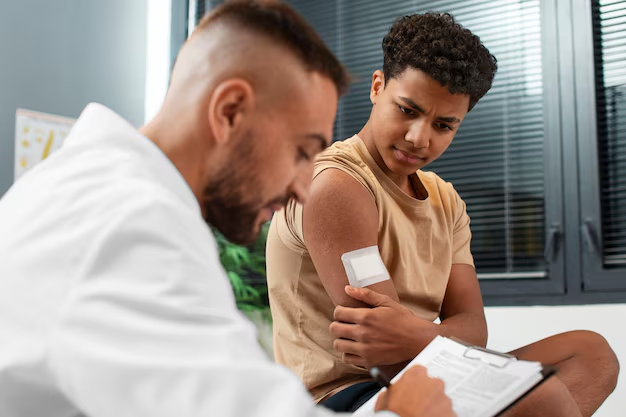Understanding Shingles: Will It Go Away?
Imagine feeling a tingling sensation on your skin, quickly followed by an itchy, painful rash. You've likely heard of shingles, but the thought of experiencing it can be daunting. Many people are left wondering, "Will shingles ever go away?" This article aims to demystify shingles and provide a comprehensive understanding of this common but often misunderstood condition.
What is Shingles?
Shingles is a viral infection that results from the reactivation of the varicella-zoster virus, the same virus that causes chickenpox. After a person recovers from chickenpox, the virus remains dormant in the body. For reasons not entirely understood, it can reactivate years later as shingles.
Symptoms of Shingles
Typically, shingles begins with burning or tingling pain, followed by a red rash that can develop into fluid-filled blisters. The rash often appears as a stripe around one side of the body or face. Common symptoms include:
- Pain or burning: Often the first sign, it can be mild to severe.
- Rash: Appearing a few days after the pain, often as a stripe.
- Blisters: Fluid-filled and can burst, scabbing over in 7-10 days.
- Sensitivity to touch
- Itchiness
Other symptoms may include fever, headache, and fatigue. It's crucial to recognize shingles early to manage the symptoms effectively and avoid complications.
Does Shingles Go Away on Its Own?
Yes, shingles eventually goes away on its own, typically lasting between two to six weeks. However, individual experiences can vary. The pain usually diminishes as the blisters heal, though some individuals may experience long-term effects.
Factors that can influence how long shingles lasts include:
- Age: Older adults might experience more severe symptoms and longer recovery times.
- Immune System: Those with weakened immune systems may face prolonged symptoms.
- Severity: A more extensive rash might take longer to heal.
When to Seek Medical Attention
While shingles can resolve on its own, it's advisable to seek medical attention to manage symptoms better and prevent complications. Early treatment can help reduce the severity and duration of the illness. If you notice signs of shingles, particularly around sensitive areas like the eyes, contact a healthcare provider promptly.
Potential Complications of Shingles
While most recover from shingles without long-term issues, some may encounter complications. It's essential to be aware of these to seek timely intervention.
Postherpetic Neuralgia (PHN)
Postherpetic Neuralgia (PHN) is a common complication where pain persists long after the rash has healed. PHN is more likely in older adults and can last for months or even years. Managing PHN often involves medications to alleviate persistent discomfort.
Vision Problems
If the shingles rash occurs near the eye, it can lead to serious eye problems, including vision loss. This condition, known as ophthalmic shingles, requires immediate attention from an eye specialist.
Other Potential Complications
- Neurological problems: Depending on the affected nerves, shingles can lead to brain inflammation or facial paralysis.
- Skin infections: Scratching or improper care of the rash can result in bacterial infections.
Available Treatments for Shingles
While there's no cure for shingles, several treatment options are available to relieve symptoms and prevent complications. It’s essential to discuss these with a healthcare provider to find the best fit.
Antiviral Medications
Antiviral drugs, such as acyclovir, valacyclovir, or famciclovir, can help reduce pain, speed up healing, and prevent complications. Starting these medications within 72 hours of rash onset maximizes effectiveness.
Pain Management
Effective pain management can significantly improve the quality of life for those with shingles. Options include:
- Over-the-counter pain relievers: Such as acetaminophen or ibuprofen.
- Prescription medications: Including gabapentin or pregabalin for more severe pain.
- Topical numbing agents: Creams or patches to relieve localized pain.
Home Care Tips
In addition to medication, some home remedies can help alleviate symptoms:
- Cool compresses: Apply to the rash to reduce itchiness and inflammation.
- Calamine lotion: Provide relief from itching.
- Oatmeal baths: Soothe the skin and reduce irritation.
Preventing Shingles
The best way to prevent shingles is through vaccination. Vaccines not only help reduce the risk of developing shingles but also lessen the severity if you do get it.
Shingles Vaccination
Two shingles vaccines are available, with Shingrix being the preferred choice. It is recommended for adults over the age of 50 and those with compromised immune systems. Shingrix requires two doses for optimal protection.
Lifestyle Considerations
While shingles is largely caused by the reactivation of a dormant virus, maintaining a healthy lifestyle can bolster your immune system and potentially reduce your risk. Consider these lifestyle tips:
- Healthy diet: Aim for a well-balanced diet rich in fruits, vegetables, and whole grains.
- Regular exercise: Keeps your immune system strong.
- Stress management: Practice meditation, yoga, or other stress-reducing techniques.
- Adequate sleep: Ensure you get enough rest to support overall health.
Living with shingles can feel overwhelming, but understanding the condition and taking proactive steps can significantly manage its impact. Prioritize staying informed and working closely with healthcare professionals to navigate a shingles diagnosis.
Summary of Key Points
Here's a quick recap to address the primary concerns and next steps regarding shingles:
- 🦠 Shingles is caused by the reactivation of the chickenpox virus.
- ⌛ Symptoms typically last 2-6 weeks but can vary by individual.
- 🔍 Seek medical attention promptly for severe symptoms or complications.
- 💊 Antiviral medications can reduce duration and severity if taken early.
- 🚑 Complications may include postherpetic neuralgia and vision problems.
- 💉 The Shingrix vaccine is recommended for prevention, especially for those 50+.
- 🙌 Healthy lifestyle choices may bolster your immune response against the virus.
Understanding shingles—through this guide—equips individuals to act swiftly and confidently if they face a potential outbreak. Engage proactively with healthcare providers and adopt health-focused habits to minimize the impact of shingles in your life.

